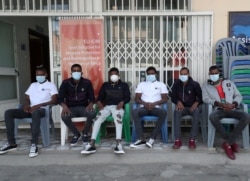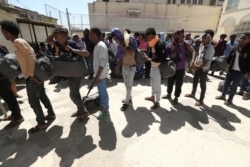Portrayals of migration flows in Africa are often misconstrued and mischaracterized, according to a major new report from the African Union and International Organization for Migration. Among other things, the report says most African immigrants are crossing land borders in the continent, not trying to sail across seas and oceans on rickety boats.
Experts say those false perceptions have a detrimental impact on policies, whereby most of the money goes to deterring people from traveling north across the Mediterranean rather than focusing on the 80 percent of Africans who have no interest in leaving the continent when they migrate.
This leads to a "horrific sensationalized impression of irregular migration from Africa," the Africa Migration Report says.
Maureen Achieng, the International Organization for Migration's chief of mission to Ethiopia, who authored the report, spoke to VOA in an interview.
"In the case of Africa, the false narrative is that all Africans are trying to get across the Mediterranean to Europe. Nothing could be further from the truth," she said. "Most African migration is intra-Africa, in other words those Africans who migrate across land borders, not seas. The danger in propelling these false narratives is that then migration policies and migration programs form that aspect to the detriment of other migration issues on the continent that require just as much if not more attention."
To curb irregular migration, the African Union has adopted two major pieces of legislation designed to prevent events such as the tragedy in March when 64 Ethiopians suffocated inside a truck in Mozambique en route to South Africa.
One is the African Continental Free Trade Area, which will launch in January and is designed to allow goods to flow freely across borders. The other is a free movement protocol, which when fully implemented, would get rid of the need for visas in order to cross a border.
"The objective of these two key AU decisions is to push Africa toward continental integration both through movement of goods but equally through the freer movement of people," Achieng said. "Right now, most Africans still need a visa to get to another African country."
According to the report, migration initiatives on the continent are "yet to be truly driven by African aspirations" and instead focus on addressing concerns of donor countries, such as securing borders in the Sahel.
The report states there is a desperate need to share better information and data on migration between countries in Africa and Europe so that policies can be better targeted and become more relevant.
Sabelo Mbokazi, head of the African Union's labor, employment, migration and social affairs department, said migration policymakers would be better served to address root causes of migration such as unemployment.
"Very few migrants who are migrating want to go to America, want to go to Europe," he told VOA via a messaging app. "There are very few as compared to ... the migration happening within the continent. We think that should be the focus in developing Africa."
Although the report said there is a dearth of information on irregular migration, it also says that the numbers available show the majority of migration to Europe has been legal and regular. Between 2011 and 2017, for instance, regular entries in the EU from countries in Northern and Western Africa outnumbered irregular entries by sea to Italy.
















